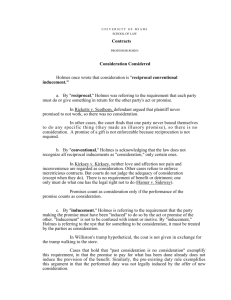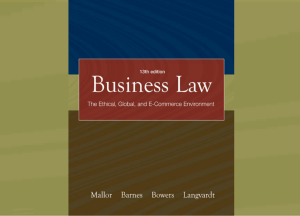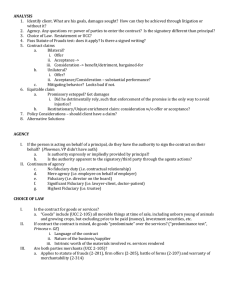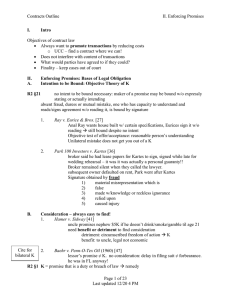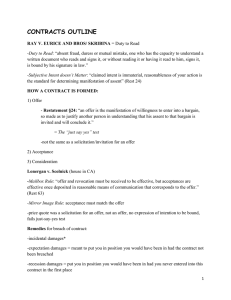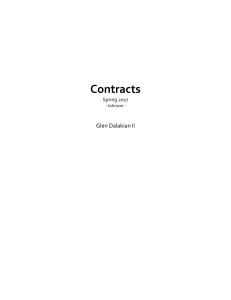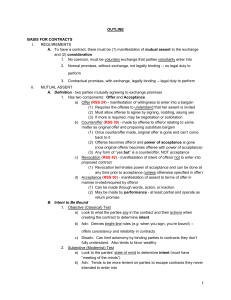C O N T R A C T L A W - Law Classes for Tribal Courts
advertisement
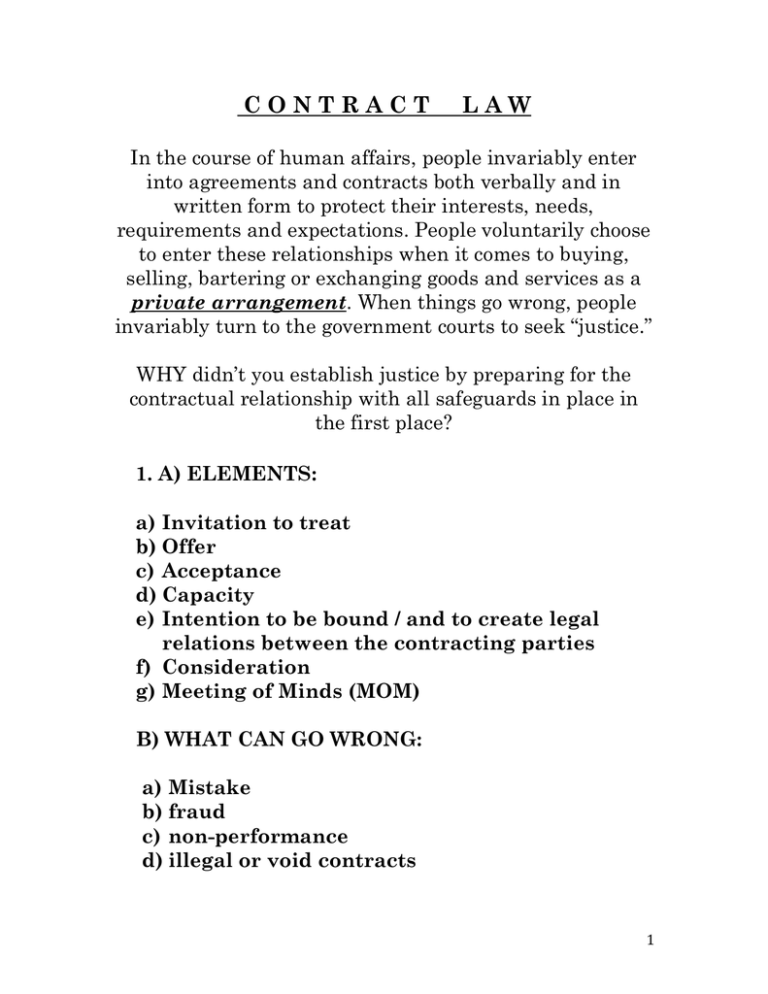
CONTRACT LAW In the course of human affairs, people invariably enter into agreements and contracts both verbally and in written form to protect their interests, needs, requirements and expectations. People voluntarily choose to enter these relationships when it comes to buying, selling, bartering or exchanging goods and services as a private arrangement. When things go wrong, people invariably turn to the government courts to seek “justice.” WHY didn’t you establish justice by preparing for the contractual relationship with all safeguards in place in the first place? 1. A) ELEMENTS: a) Invitation to treat b) Offer c) Acceptance d) Capacity e) Intention to be bound / and to create legal relations between the contracting parties f) Consideration g) Meeting of Minds (MOM) B) WHAT CAN GO WRONG: a) Mistake b) fraud c) non-performance d) illegal or void contracts 1 e) failure to understand by failing to ask specific questions (MOM) f) impossibility g) promises h) guaranties and warranties i) implied contract j) express contract 2. THE LAW a) Article 1, section 10, U.S. Constitution: “. . . No State shall impair the obligations of a contract . . .” b) Uniform Commercial Code (UCC); UCC § 2207(1) –OFFER; UCC § 2-207(2) – ACCEPTANCE; c) Vienna Convention of 1988 (when contracting parties are in different countries) d) Restatement (Second) of Contracts e) Federal Arbitration Act 3. CASE LAW Laidlaw v. Organ, 15 U.S. 178 (1817) the seller of tobacco was not entitled to get out of a contract to sell a load at a low price when it transpired that the War of 1812 had ended, and so that prices would rise (because a navy embargo was lifted). Even though the buyer stayed silent about the peace treaty that had 2 just been agreed when he was asked if prices might rise, he was entitled to enforce the contract. Pando v. Fernandez, 127 Misc.2d 224 (N.Y. Sup. Ct. 1984) it was held that it was not impossible to prove that a boy had agreed with the winner of $2.8m in a lottery that she would share the winnings with him ProCD, Inc. v. Zeidenberg, 86 F.3d 1447 (7th Cir. 1996) the click of a button accepting a license's terms on software counts as agreement Specht v. Netscape, 306 F.3d 17 (2d Cir. 2002) simply clicking a download button does not indicate agreement to the terms of a contract if those terms were not conspicuous. Angel v. Murray, 322 A.2d 630 (RI 1974) modification of a contract does not require consideration if the change is made in good faith and agreed by both parties. Hamer v. Sidway, 124 N.Y. 538, 27 N.E. 256 (N.Y. 1891) promising to not behave anti-socially amounted to valid consideration for a contract, in this case payment of money by an uncle to a nephew to not swear, drink, gamble and smoke. Kirksey v. Kirksey, Ala. Sup. 8 Ala. 131 (1845) an old case holding that it was not sufficient consideration to promise to visit a person, in return for getting a house. Ligenfelder v. Wainwright Brewing Co., 15 S.W. 844 (1891) promising not to sue did not amount to valid consideration McMichael v. Price, 58 P.2d 549 (OK 1936) mutuality of obligation, and an illusory promise. It was not illusory to promise to buy all sand from one supplier, even though there was no contractual obligation to buy any sand at all. This meant there was sufficient mutuality of obligation. Wood v. Lucy, Lady Duff-Gordon, 222 N.Y. 88, 118 N.E. 214 (1917) it was sufficient consideration to promise to represent someone's interests. Salsbury v. Northwestern Bell Telephone Co., 221 N.W.2d 609 (IA 1974) charitable subscriptions can be enforced without consideration or detrimental reliance 3 Seixas v. Woods 2 Cai. R. 48 (N.Y. Sup. Ct. 1804) a contract was binding despite making a mistake. DeCicco v. Schweizer, 117 N.E. 807 (1917) Cardozo J held a daughter was entitled to enforce a promise by her father to her husband to pay her instalments of money, because she had knowledge of the promise. There was sufficient "consideration". 4




